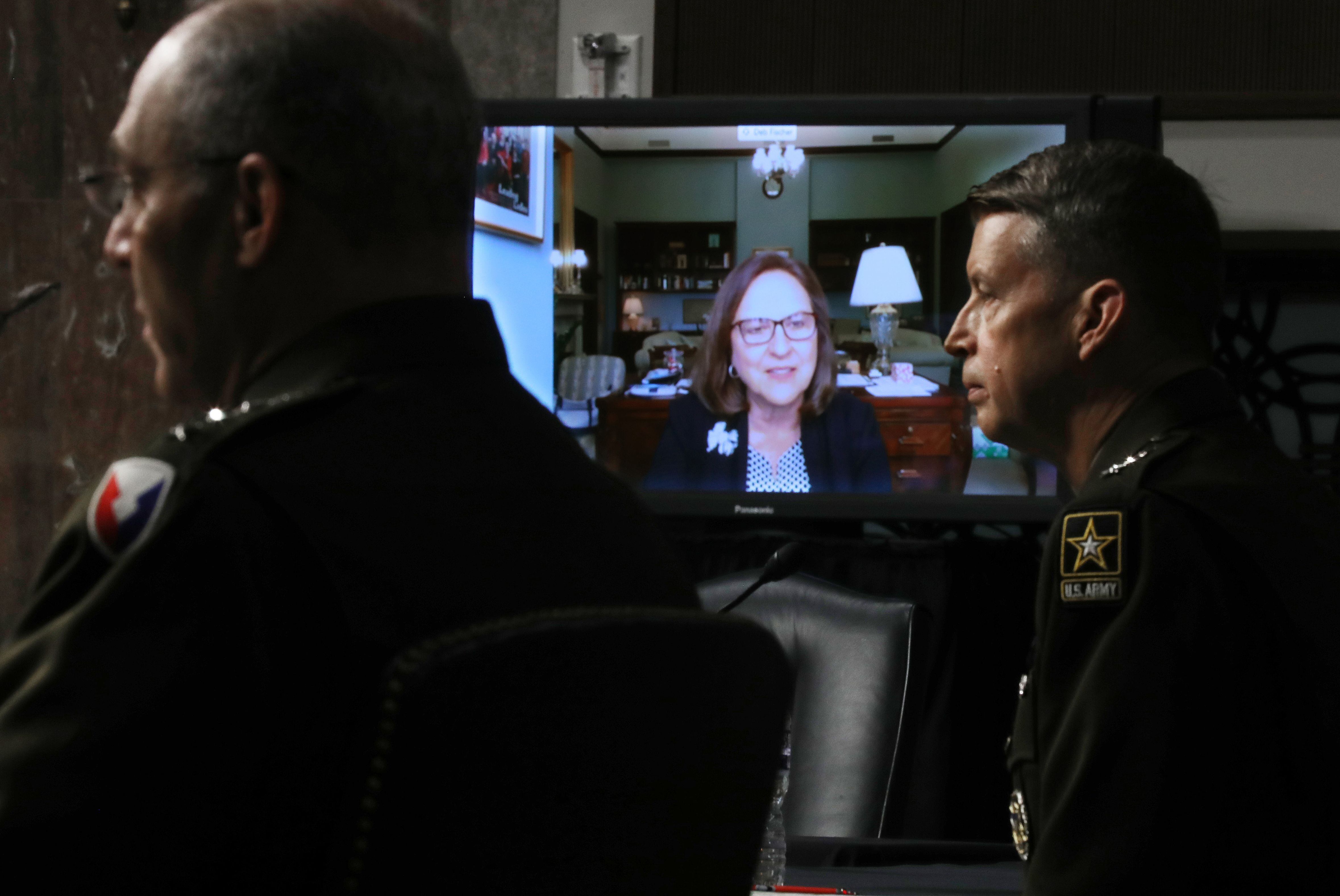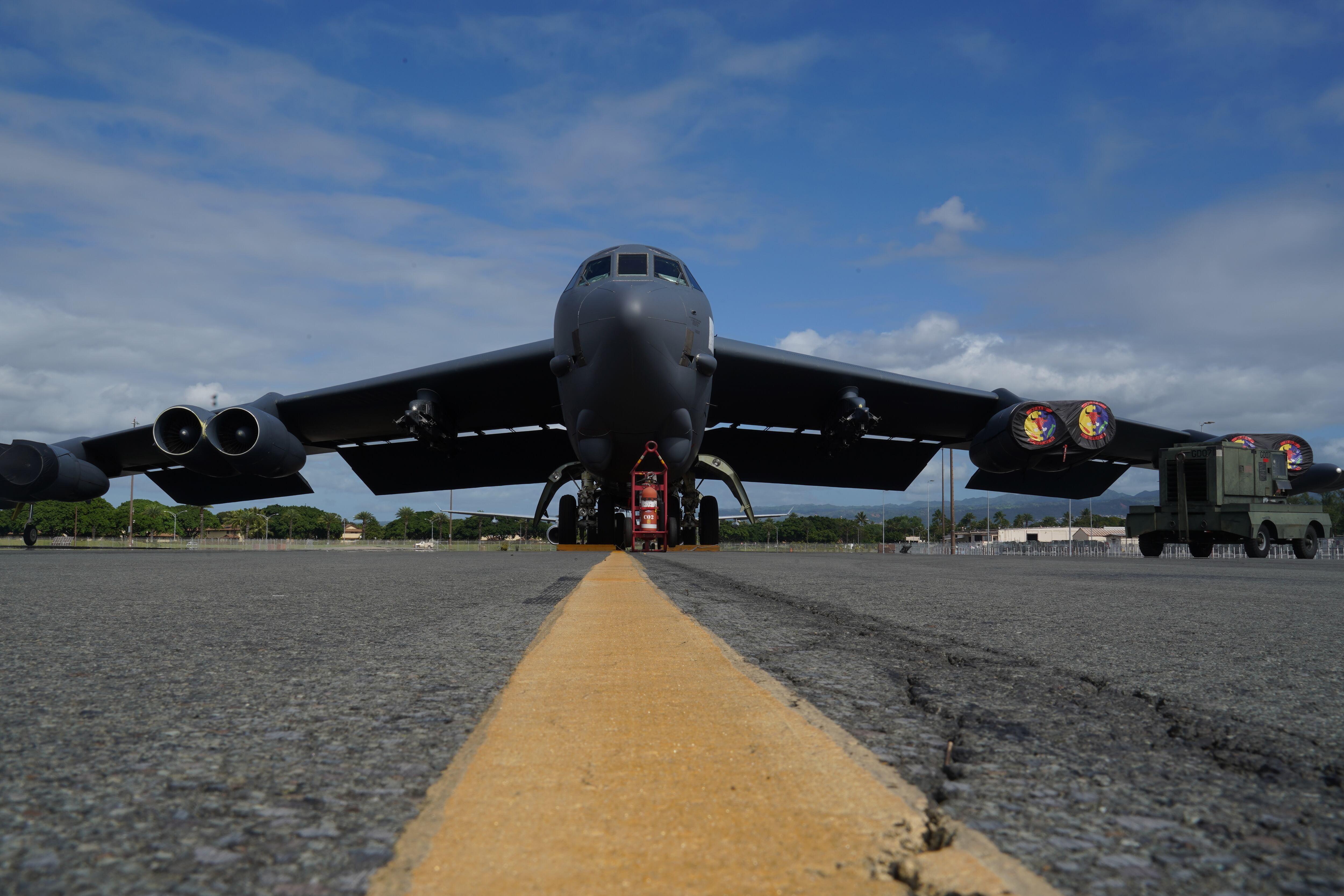WASHINGTON ― The war over developing a next-generation intercontinental ballistic missile ― whether it’s vital to deter Russia and China, as conservatives say, or whether existing missiles can be overhauled for less ― flared up at the U.S. Capitol on Wednesday.
Lawmakers from both parties leveled pointed questions at Pentagon officials over whether it’s worthwhile to study extending the life of the 50-year-old Minuteman III as an alternative to its $100 billion replacement program, the Air Force’s Ground Based Strategic Deterrent.
In the lead up to the Biden administration’s far-reaching nuclear posture review, left-leaning lawmakers say the Pentagon’s $1.2 trillion nuclear modernization plans are a money pit and question whether the United States could deter its rivals for less with only its bombers and submarines. Conservative lawmakers worried GBSD needs protection from cancellation are opposing further analysis by the Pentagon.
Progressives last month offered legislation to scrap GBSD and shift $1 billion from the program to help develop a COVID vaccine ― potentially a long shot after the panel rejected a similar measure to defund GBSD last year, in a bipartisan vote.
Northrop Grumman, which the Air Force awarded a $13.3 billion contract in September to develop GBSD, has a lot riding on the outcome of the debate. So do the states that host the Minuteman III, deployed across Colorado, Montana, Nebraska, North Dakota, and Wyoming.
GBSD’s high-powered defenders from both parties include Senate Defense Appropriations Subcommittee Chairman Jon Tester, D-Mont., who vowed in public remarks to be “working to make sure that this program stays on track.”
RELATED

Wednesday’s venue was a hearing before the House Strategic Forces Subcommittee, where the panel’s top Republican, Rep. Mike Turner, said he’d been told of a recently-initiated Pentagon study into the cost-effectiveness of cannibalizing parts from 200 Minuteman III’s to stretch the lives of other 200.
Turner, of Ohio, asked Acting Assistant Secretary of Defense, Strategy, Plans and Capabilities Melissa Dalton whether a study by the Pentagon’s Cost Assessment and Program Evaluation office was ongoing, as he’d heard, and why.
“Every time this has been studied, it’s been seen as ill-advised, to look at any life extension of Minuteman III ― not just merely for costs but also for capabilities,” Turner said. “Ms. Dalton, are you aware of this study, did you approve it and what is in this study?”
Amid Turner’s questions, Dalton said she wasn’t aware any such study was underway but said she’d look into it and keep Turner informed. The GBSD program would be examined, she said, in the course of drafting the Biden administration’s nuclear posture review and national defense strategy.
As the strategic reviews look at threats and current capabilities to counter them, “we will of course be looking at at cost and what is the right balance of the mix of programs that may be necessary to have a safe, effective, and secure nuclear deterrent well into the future,” she said.
Sources previously told Defense News that either a CAPE analysis was underway or under discussion.
The hearing’s sharpest exchanges were between California Democratic Rep. John Garamendi, whose amendment to require DoD study a life-extension to 2050 died in committee last year, and U.S. Strategic Command’s chief, Adm. Charles Richard, who argues the Minuteman IIIs is dangerously obsolete.
When Richard said the Defense Department had reported several times to Congress ― in a 2019 analysis most recently ― that a life-extension would not be cost-effective, Garamendi cut him off to say the assumption in DoD’s analysis was that Minuteman III’s life could be extended. Then Richard grew more emphatic.
“From an operational point of view, I do not see an operational reason to even attempt to do that,” Richard replied. “The Minuteman III is 1970s-era, designed to go against Soviet analog defenses. I need a weapon that will work and make it to the target, and to expect that, in the timeframes you’re talking about, to penetrate potentially advanced Russian and Chinese systems is going to be a challenge.”
When Garamendi cited 2019 testimony that it would be technologically feasible to extend the life of the propulsion and guidance systems one more time (the witness then was Lt. Gen. Richard Clark, then the Air Force’s deputy chief of staff for strategic deterrence and nuclear integration), Richard pointed out that the Air Force would be the best source of any cost analysis and the defense secretary the ultimate decider.
“Now don’t go off talking to me about the secretary of defense. We’re talking about the viability of the Minuteman III,” Garamendi said. “If I’m incorrect and it is not possible to extend it one more time, then please provide the written documentation to that.”
RELATED

Richard said, as an operational commander, he wasn’t sure it was technically possible to extend the life of the Minuteman III or harden its command-and-control systems from a cyber attack, as those systems were “designed before the internet.”
“Why are you not sure? It’s your business to be sure,” Garamendi said, prompting Richard to fire back: “Exactly. That’s why I need a new one.” Then Garamendi’s time expired.
Later, Wyoming Republican Rep. Liz Cheney pushed back, saying her colleagues’ solution to Russia and China’s nuclear buildup and expansion programs, “is for us to risk our own security, to tie our own hands with ‘no-first use,’ to reduce our own capabilities, to delay yet again modernization.”
While China is estimated to have about 320 warheads ― much less than the U.S. and Russia ― Richard said its arsenal is undergoing “a breathtaking expansion.” By way of contrast, Richard went on to say the long list of scarce parts for America’s Minuteman III includes a launch switch for control centers that no company will manufacture anymore.
“It’s like asking a company to make a dial-up modem. There’s no profit in doing something like that,” Richard said. “The Air Force has been consistently pulling rabbits out of the hat to solve these problems. I’m afraid there’s a point where they won’t be able to pull the rabbit out of the hat and the system won’t work.”
Joe Gould was the senior Pentagon reporter for Defense News, covering the intersection of national security policy, politics and the defense industry. He had previously served as Congress reporter.
Aaron Mehta was deputy editor and senior Pentagon correspondent for Defense News, covering policy, strategy and acquisition at the highest levels of the Defense Department and its international partners.
Valerie Insinna is Defense News' air warfare reporter. She previously worked the Navy/congressional beats for Defense Daily, which followed almost three years as a staff writer for National Defense Magazine. Prior to that, she worked as an editorial assistant for the Tokyo Shimbun’s Washington bureau.







